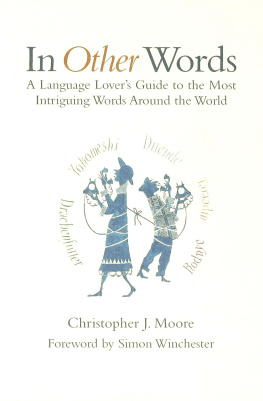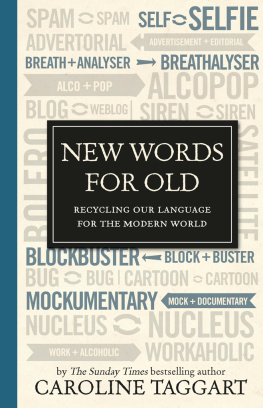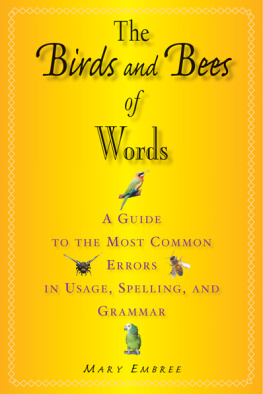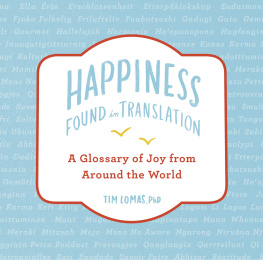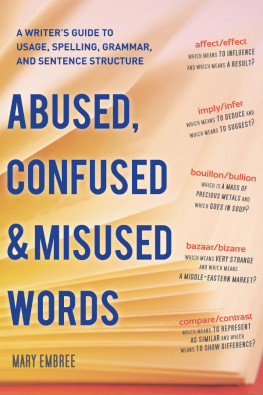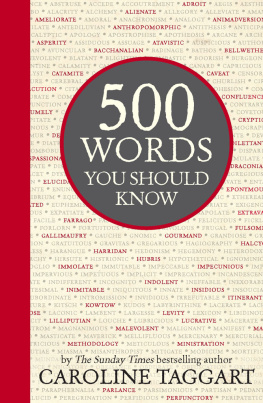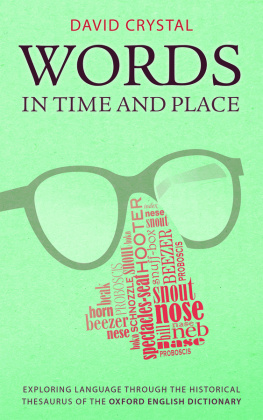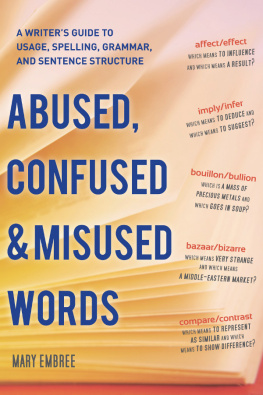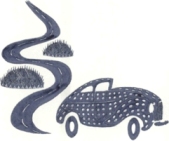Christopher J. Moore
Acknowledgments
Does travel narrow the mind, as the cynical saying goes? Or does it bring you into an endless realm of fun, liveliness, incredulity, and oddities, in the spirit of the Czech proverb,"Each new language offers you another life" (see chapter 2). Risking all, my own life has tended toward the latter, and some of the fruit of these experiences is offered in the following pages. The 250-odd untranslatable words and phrases gathered into this collection, from over 55 countries, are completely random and whimsical, and I have made no attempt whatsoever to be exhaustive in either languages or words. They reflect no more than ideas, concepts, phrases, and sayings, which have at one time or another lodged in a curious mind and made it even more curious.
The words are shown as phonetically pronounced by an English speaker, with the stress shown in italics. Where some compound words, as in German, have two stresses, the first will be the stronger. Some specific vowels and consonants are indicated below.
j- is the French sound j-, a soft, slurred jay.
dj- is the English sound j- in jail.
tch- is the sound ch- in chatter.
ch- or -ch is the sound -ch in Scottish loch.
-onh is the nasal French sound on.
-anh is the nasal French sound in.
-o- is a short -o- as in hot.
-oh- is a long -o- as in comb.
-a- is a short -a- as in fat.
-ay- is the long -a- as in fake.
-ah is a long -a- as in far.
-i is a short -i- as in dip.
-ey- is a long -i- as in hide.
The net must be cast wide for the breadth of information gathered in a book of this kind, and many friends, colleagues, and collaborators have pointed me in useful directions, or given help in specialist areas. I should like to acknowledge gratefully the following contributions and sources as listed below.
Jan Bogaerts for contributions on Dutch life and linguistic inventiveness.
David Bond for problems of cross-cultural translation in "Playing with Words or The Real Fun of Language,"
English-Learning and Languages Review, 1999.
Dr. Qing Cao, Senior Lecturer in Chinese and program leader in Chinese Studies at Liverpool John Moores University, United Kingdom, for his contribution to and clarification of Chinese words.
Chamouni, of ProZ Forums, for untranslatables from Haitian Creole.
Marc Chavannes for interpreting gedogen in " Gedogen Allows the Dutch to Manage the Unmanageable," University of California, Berkeley, Public Affairs Report, Vol. 41, No. 4, September 2000.
The Copenhagen Post for a colorful explanation of the elusive Danish concept of hygge in "Hygge - A nation's defence mechanism?" 8 January 2004.
Tim Davies, freelance translator specializing in Danish, Norwegian, and Swedish, for his contribution of Swedish and Danish words.
Rose del CastilloGuilbault for her thoughts on the misunderstandings surrounding macho in "Untranslatable Words: 'Macho,'" Ponencias Instituto Cultural "Races Mexicanas," 1996.
Thomas G.Dineen III for reflections on the Greek quality of thymos in "Cultural Conservatism, a compendium of traditionalist thought on politics, literature, the fine arts, and other matters," www.culturalconservatism.org
R.M.W. Dixon for his scholarship on Australian indigenous languages in The Languages of Australia, St. Lucia: Cambridge University Press, 1980.
Grgoire Dunant for the use of his all-embracing linguistic library in Geneva.
Graham Dunstan Martin for thoughts on French untranslatability.
EddyEchternach for a Web window into the mind of the Dutch, www.eddyechternach.nl
Elvin Geng for his article "What's In a Word - U.S.-China Relations Built on a Frail Bridge of Language," Pacific News Service, February 1998.
Juan Goytisolo for his article "Jema-el-Fna's thousand and one nights," The Courier, Unesco, December 2000.
David C. Gross for his entertaining English-Yiddish Dictionary, Hippocrene Books, New York, 1995.
AndrewHorvat,Japanese Beyond Words: How to Walk and Talk like a Native Speaker, California: Stone Bridge Press, 2000.
ThomasHyllandEriksen for insights into Scandinavian nationalities in "Images of the neighbour, reciprocal national stereotypes in Scandinavia," 1997, folk.uio.no/geirthe/Scandinavian_ images.html
Yelena Kalashnikova for material from an interview titled '"There are no good and bad translators. There are only felicitous and infelicitous translations' But only a good translator can produce a felicitous translation" with the translator Vladimir Muravyov in The Russian Journal, 16 July 2001.
Tim Kirk for background on German political language, in his thorough and illuminating Dictionary of Modern German History, Cassell, 2002.
Boy Lafayette De Mente for his words about yoko meshi in The Japanese Have a Word for It, Chicago: Passport Books, 1994.
Dominik Luke for his article explaining the idiosyncracies of the Czech language in "Czech Language Inside Out," www.bohemica.com
Christian Maclean for interpretations of the German notion of Gemt.
Joumana Medlej for interesting observations on Arabic culture in "Thinking about Tongues," www.cedarseed.com/air/blabla3.html
Noemi Moll Verdejo for generous help with Spanish cultural byways.
Ineke Mok and Peter Reinsch for explaining the Dutch term medclander in Handbook for International Teaching Materials, Utrecht: Parel, 1999.
Alain Nicollier for his comprehensive Dictionnaire des mots suisses, Geneva: Editions GVA, 1990.
Nigel Pennick for thoughts on Norse traditions from Rune Magic: The History and Practice of Ancient Runic Traditions, New York: Harper Collins, 1993.
Stephen Ryan, Eichi University for cross-cultural issues in Russian and English, reporting from the 1998 TESOL RussiaFar East International Conference, 22-24 September 1998, Khabarovsk, Russia, The Language Teacher, January 1999.
David Shyovitz for background in "The History and Development of Yiddish," Jewish Virtual History, 2003.
Tang Si Xian in Taiwan for insights into daily life in Chinese society.
Jeffrey Tayler for reflections on the uncertainties in Russian life in "Searching for equanimity in the skies above Siberia," Atlantic Monthly, February 2001.
Daryl Taylor, licensed translator of Finnish into English, for his contribution and clarification of Finnish untranslatables.
Albert Valdman for background on Creole and pidgin in Le Crole, Paris: Editions Klincksieck, 1978.
Dragan Veliki for an extract from "Budapest, Strictly Personal," translated by Marco Ivi?, The Hungarian Quarterly, Vol. 41, No. 157, October 1999.
Christina Waters for thoughts on the word terroir, quoted in Frank Galuszka's "The Palette as a System," Proceedings of the American Society for Cybernetics 2001 Conference, Vancouver, May 2001.
Alan Watts for his insightful Tao: Thc Watercourse Way,

